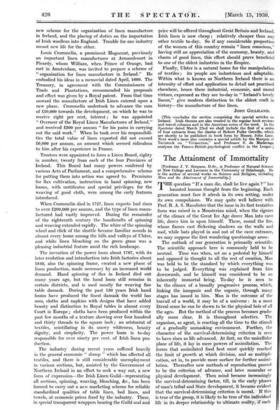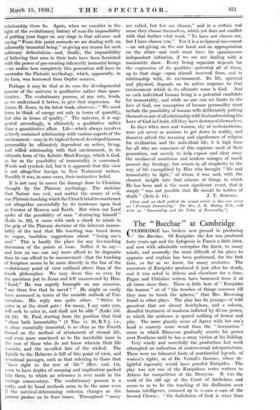The Attainment of Immortality
[Professor J. Y. Simpson, D.Sc., is Professor of Natural Science at New College and Lecturer in the University of Edinburgh. He is the author of several works on Science and Religion, including Man and the Attainment of Immortality.] T' question "If a man die, shall he live again ? " has haunted human thought from the beginning. Each generation must face it afresh in its own setting, under its own compulsions. We may quite well believe with Prof. R. A. S. Macalister that the issue in its first tentative form was raised in a Mousterian mind, when the rigours of the cliinak of the Great Ice Age drove Man into cave life, drove him in upon himself. There, round the fire, whose flames cast flickering shadows On the walls: and roof, while bats played in and out of the cave entrance, we may suppose the first wondering questionings arose.
The outlook of our generation is primarily scientific.
The scientific approach here is commonly held to be neutral. Time was when, Set on a pedestal by himself and opposed in thought to all the rest of: creation, Man 'was held to be the standard by which everything was to be judged. Everything was explained from him downwards, and he himself was considered to be an inherently immortal being. To-day he is seen to be the climax of a broadly progressive process, which, linking the inorganic and the organic, through many stages has issued in him. Man is the outcome of the travail of a world, it may be of a universe : in a most literal sense he can be shewn to be the physical heir of all the ages. But the method of the process becomes gradu- ally more clear. It is throughout selective. The organism, as agent, is reacting all the time to the stimuli of a gradually unmasking environment. Further, the character of the survival-determining criterion is seen to have risen as life advanced. At first, on the unicellular 'plane of life, it lay in mere powers of assimilation. The forms that assimilated food best most quickly reached the limit of growth at which division, and so multipli- cation, set in, to provide more surface for further assimi- lation. Thereafter new methods of reproduction proved to be the criterion of advance, and later muscular or physical development. Then mind became increasingly the survival-determining factor, till, in the early phases of man's tribal and State development, it becanie evident that the survival-deterMining criterion is moral. If this is true of the group, it is likely to be true of the individual life in its deeper relationship to ultimate reality, if such relationship there be. Again, when we consider in the light of the evolutionary hiatory of man the impossibility of putting your finger on any stage in that advance and saying "-From thii point onwards we are dealing with an inherently immortal being," or giving any reason for such arbitrary delimitatiOn—and, finally, the impoisibility of believing that men in their lusts have been furnished with the power of pro-creating inherently immortal beings -=we realize how completely this generation will have to surrender the Platonic 'mythology; which, apparently, in its turn, was borrowed from OrphiC sources. Perhaps it may be that at its core the developmental Process of the universe is qualitative rather than quan- titative. The evolutionary process, at any rate, tends; as we understand it better, to give that impression. Sir James H. Jeans, in his latest book, observes : " We must learn to think of energy not only in terms of quantity, but also in terms of quality." The universe, it is sug- gested accordingly, is ultimately a qualitative rather than a quantitatiVe affair. Life--whieh alwaYs .inVolves actively sustained relationship with various aspects of the enviroimnentmay in its highest fcirm of developed human personality be ultimately dependent on active, living, and willed relationship with that environment, in its ultimate form of the Infinite Mind-Energy, which is God, so far as the possibility of immortalityis concerned. Words and symbols fail, but it is apparent that this view is not altogether foreign to New Testament writers. Possibly it was, in some cases, their instinctive belief. It is not easy to assess the damage done to Christian thought by the Platonic mythology. The doctrine that Nature was evil, and matter the source of evil, was Platonic teaching which the Church tried to counteract not altogether successfully by its insistence upon God as Creator of Heaven and Earth. But when our Lord spoke of the possibility of man " destroying himself " (Luke ix. 25), it came with such a shock to minds in the grip of the Platonic doctrine of the inherent immor- tality of the soul that His teaching was toned down to vague, toothless suggestions about " losing one's soul." This is hardly the place for any far-reaching discussion of the points at issue. Suffice it to say— and here no one can any more afford to be dogmatic than he can afford to be unconcerned—that the teaching of Scripture seems to be more directly in the line of the evolutionary point of view outlined above than of the Greek philosopher. We may deem this so even by the questions put to Jesus and left unanswered by Him. " Lord," He was eagerly besought on one occasion, " are there few that be saved ? " He might so easily have answered in terms of the amiable outlook of Uni- versalism. His reply was quite other. " Strive to enter in at the strait gate : for many, I say unto you, will seek to enter in, and shall not be able " (Luke xiii. 23, 24). St. Paul,' starting from the position that God " alone hath immortality " (1 Tim. vi. 16, R.V.), i.e., is alone essentially immortal, is as clear as the Fourth Gospel on the method of attainment of eternal life, and even more convinced as to the inevitable issue in the ease of those who do not know wherein their life consists, and the so-called fate of the wicked. The Epistle to the Hebrews is full of this point of view, and occasional passages, such as that referring to those that `` have right to the tree of life " (Rev. xxii. 14), seem to have depths of meaning and implication 'packed into them, to which no reference is ever made in the average commentary. The evolutionary process is a unity, and its basal methods seem to be 'the same even if the survival_-determining criterion changes as the process pushes on to finer issues. Throughout " many are called, but few are chosen," and in a certain real sense'they choose themselves, which yet does not conflict with that farther vital word, " Ye have not chosen me, but I have chosen you." For it is a reciprocal movement -out-giving on the one hand and an appropriation on the other—and each must have his spontaneous independent initiation, if we are not dealing with a marionette show- Every living organism depends for the expression of its qualities—potential all of them, up to that stage—upon- stimuli - received from, and in relationship with, its environment. Its life, spiritual and physical, depends on its active response to that environment which in its ultimate sense is God. And so each individual human being is a potential candidate for immortality, and while no one can set limits to the love of God, our conception of human personality* must include the possibility of human wills deliberately putting themselves out of all relationship with God and resisting the Love of God in Christ, till they have destroyed themselves. In days when men and women, shy of ecclesiasticism, were yet never so anxious to get down to reality, and discover afresh the meaning and significance of religion for civilization and the individual life, it is high time for all who are conscious of this supreme need of their generation, not merely to help expose and clear away the mediaeval mustiness and modern mirages of much present day theology, but return in all simplicity to the way of life exemplified by Him who brought ." life• and immortality to light," of whom it was said, with the clearest insight into that scheme of things in which He has been and is the most significant event, that it simply " was not possible that He should be holden of [Nest week we shall publish the second article in 'this new series on " Personal Immortality." The Rev. J. K. Mozley, D.D., will write on. " Immortality and the Value of Personality."]





















































 Previous page
Previous page